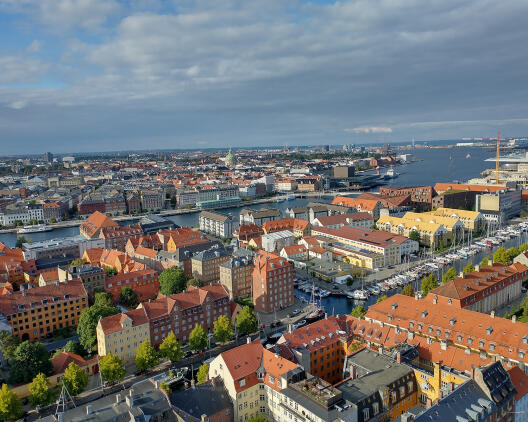New Cooperation Agreement with the University of Copenhagen

It's official now: The Cluster of Excellence Mathematics Münster has signed a cooperation agreement with the Department of Mathematical Sciences at the University of Copenhagen. We spoke with Thomas Nikolaus, spokesperson of Mathematics Münster, about the background and opportunities of this collaboration.
What makes the Department of Mathematical Sciences at the University of Copenhagen so special?
Thomas Nikolaus: The Department of Mathematical Sciences is among the top mathematical research institutions in Europe. They have a very similar research profile to ours here in Münster. They also work in areas such as topology, operator algebras, homotopy theory, and number theory. In my research area, topology, it is one of the absolute top universities.

What connects Mathematics Münster with our new partner in Copenhagen?
Thomas Nikolaus: A lot! Over the years, a close collaboration has developed between our two institutions. Mikael Rørdam, a respected scientist in the field of operator algebras, is a member of the Scientific Advisory Board of Mathematics Münster.
The exchange happens at all career levels. I always enjoy sending Master students to Copenhagen. One of my doctoral researchers has spent half a year there. In return, several students have spent longer periods with us in Münster. And of course, we visit each other frequently. I myself am a regular guest in Copenhagen and enjoy working with my Danish colleagues. I am now associated with the Copenhagen Centre for Geometry and Topology, a research centre under the Department of Mathematical Sciences.
A pretty big deal was definitely the International Congress of Mathematicians (ICM) 2022. It was originally supposed to take place in St. Petersburg but had to be realised as a purely online event due to the Russian war of aggression. To avoid this, we organised in cooperation with the University of Copenhagen the "Geometry and Topology" section as a face-to-face event at very short notice and also supported it financially. That was a great joint achievement.
An agreement is initially just a piece of paper. How will the cooperation be filled with life?
Thomas Nikolaus: I envision especially a lively exchange of individuals, primarily thinking of early career researchers. I know from my own experience what a great atmosphere prevails in Copenhagen! Of course, the research stay should also make sense from a mathematical perspective. The agreement will definitely help us to overcome possible financial and administrative hurdles more easily. But it should also be an incentive to choose Copenhagen for an international stay.
Why do you think research stays are important?
Thomas Nikolaus: I recommend everyone to go abroad for a short or long period, whether as a master's student, doctoral researcher, or postdoc. It is incredibly important for developing new perspectives and for your own personal development.
I speak from my own experience. It must have been around 2010, I was a doctoral researcher in mathematical physics, and I attended the Young Topologists Meeting in Copenhagen. This conference was an eye-opener for me and a significant reason why I started to focus intensively on topology after my doctorate. I am still grateful for that trip abroad to this day.
By the way, this year we will host the Young Topologists Meeting for the first time in Münster!

